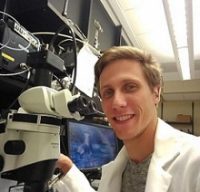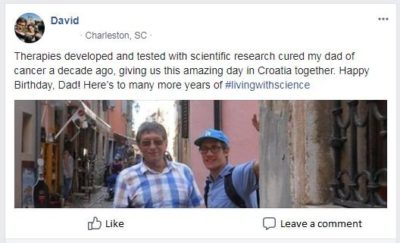 For David Hartmann, the first year of medical school was a wake-up call: many people distrust science. Growing up in an academic family and surrounded by fellow science enthusiasts in college, he was surprised when patients said they did not know which medications they were on or even flat-out refused to take them.
For David Hartmann, the first year of medical school was a wake-up call: many people distrust science. Growing up in an academic family and surrounded by fellow science enthusiasts in college, he was surprised when patients said they did not know which medications they were on or even flat-out refused to take them.
“I was confronted with this big gap—all this cool research, all this amazing knowledge that we have, and none of it seems to be trickling down to the people who we are trying to help,” Hartmann recalls. But Hartmann, an MD-PhD student at the Medical University of South Carolina (MUSC) in Charleston, was focused on the long road ahead of him and for about the next 6 years did not give the issue much thought.
As Hartmann was wrapping up his PhD research last year, he found out about the topic for the 2018 Lasker Essay Contest: “How can social media help build trust in science and the research enterprise?” He jumped at the chance to explore how to improve science communication.
Hartmann’s essay, which earned first place, made the case for promoting science through social media because science doubters are more likely to trust their friends than doctors. In his essay, he encouraged cancer survivors and their loved ones—Hartmann is in the latter group, given that his dad and grandfather both beat lethal cancers—to share photos of their happy, normal lives thanks to science-based treatments with the hashtag #livingwithscience.
 The contest also gave Hartmann the chance to try his hand at writing again. His dream career in high school was to be a travel journalist, but the only writing he really pursued was a blog in college in which he broke down complicated neurology and chemistry concepts. He jokes that three people subscribed to it, including his mom.
The contest also gave Hartmann the chance to try his hand at writing again. His dream career in high school was to be a travel journalist, but the only writing he really pursued was a blog in college in which he broke down complicated neurology and chemistry concepts. He jokes that three people subscribed to it, including his mom.
Nevertheless, it is no surprise that Hartmann penned the winning essay, according to his PhD advisor, Andy Shih, because Hartmann has a “gift” for communicating, whether training undergrad students in the lab or presenting his research at conferences.
Shih recalls one of Hartmann’s memorable talks, which was a play on the popular novel Fifty Shades of Grey. Hartmann was discussing experiments he did to characterize pericytes, a long-mysterious type of vascular cell in the brain. “Why would anybody who doesn’t study pericytes or blood vessels care, except when you capture their imagination?” says Shih, who recently moved from MUSC to Seattle Children’s Hospital.
As soon as word got out around MUSC about Hartmann’s essay, faculty started contacting him, offering to share their personal stories for #livingwithscience. Bolstered by the support, Hartmann started meeting with the MUSC social media team about how to get the movement off the ground. He is planning—it is his New Year’s resolution—to make a page on Instagram for #livingwithscience. For the first 100 or so posts, he will probably ask patients, such as those who have participated in cancer clinical trials, if they would be willing to share their photo and caption on the page.
Hartmann is now back in med school, doing clinical rotations, and once again having regular chats with people who may doubt or distrust science. But he is not discouraged; working on his essay helped him realize that he must form a relationship with patients to earn their trust.
Winning the Essay Contest changed life for David in one more way. After he completes the MD-PhD program in 2020, he is considering taking a little time off to do a science writing internship. And throughout the next chapters of his career, he would like to write pieces that explore big-picture health issues. “It’s sort of shone the light back on the writing dream,” Hartmann says.
by Carina Storrs
